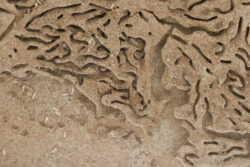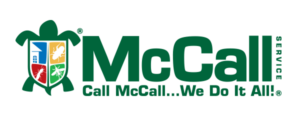No matter what type of termite you are dealing with, they can cause significant damage to your home. Determining the type of termite you have determines the course of treatment you need. In Florida, there are two main types of termites you can have: subterranean termites and drywood termites. There are major differences between the two.
Subterranean Termites
Subterranean termites build their nests in the ground, entering homes through foundations. Their colonies can grow faster than their drywood cousins because they are not confined to a small space. These colonies can number in the millions. Once a nest is established, these pests build mud tubes which they use to travel through. These protect them from predators and dehydration. Subterranean alates have wings with one single dark vein running through it, parallel to the top wing. They leave non-ridged, cardboard-like frass. Subterraneans only chew through the softest part of the wood between the grains. They also leave neat, lined galleries behind. They are generally treated with bait systems.
Drywood Termites
Drywood termites build their nests inside the wood they are infesting. They travel on air rather than through the soil. They have smaller colonies than their subterranean counterparts because they are limited in space to the confines of the wood they are infesting. Drywood colonies number in the hundreds to thousands. These pests don’t need contact with the soil and require less moisture than subterranean termites. They also don’t build mud tubes. Alates of this species have a complex system of veins on their wings. They leave six sided frass that resembles pepper. They create kickout holes they use to push excrement out of the wood they are eating. They eat across the grain of the wood. They leave erratic, smooth galleries that don’t follow the grain. Drywoods are often treated with either spot termiticide or tent fumigation.
No matter the type you are dealing with, termites can be difficult to eliminate. Contact your local pest control company for the proper identification and appropriate termite treatment plan.



